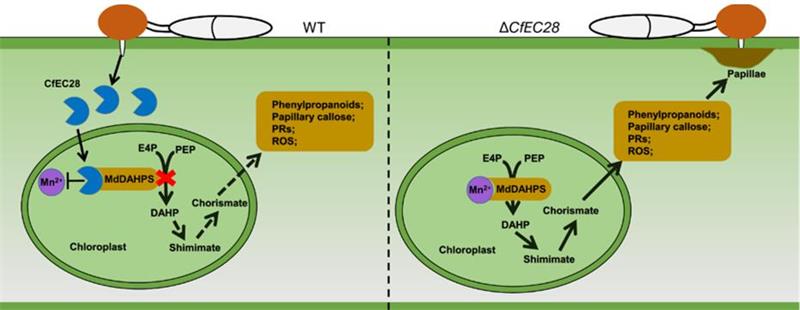Recently, the R&D Team for Fungal Diversity and Fungal Disease Control from our college published a research paper titled "A fungal effector suppresses plant immunity by manipulating DAHPS-mediated metabolic flux in chloroplasts" in New Phytologist. Using cytology, genetics, biochemistry, and other means, this study revealed a new pathogenic mechanism of the effector protein CfEC28 from Colletotrichum fructicola, the causal agent of apple anthracnose leaf blight, which targets the host shikimate pathway to suppress plant immunity and promote infection. Shang Shengping, a graduated Ph.D. student from our college, is the first author of the paper, while Professors Sun Guangyu, Zhang Rong, and Associate Professor Liang Xiaofei are the corresponding authors.
Colletotrichum contains over 200 species of pathogenic fungi that can infect thousands of plant species, making it one of the ten most important groups of plant pathogenic fungi. In apples, anthracnose leaf blight and bitter rot caused by Colletotrichum infection pose severe threats to production, resulting in significant economic losses. Effector proteins are crucial virulence factors of plant pathogenic fungi, and elucidating the functions of key effector proteins has important theoretical and practical significance for deepening our understanding of fungal pathogenic mechanisms and discovering new pesticide targets.CfEC28 is a small secreted protein specifically and highly expressed in the early stages of Colletotrichum fructicola infection. Deletion of this gene does not affect appressorium differentiation but strongly induces host callose accumulation at the infection site, leading to mutant infection defects and loss of pathogenicity. The signal peptide of CfEC28 has secretory activity and is specifically located in chloroplasts. It can target 3-deoxy-D-arabino-heptulosonate 7-phosphate synthase (DAHPS), a rate-limiting enzyme in the shikimate pathway, and inhibit its enzyme activity by blocking the binding of manganese ions to DAHPS, thereby interfering with the accumulation of secondary metabolites in the host defense mediated by the shikimate pathway.

This study is the first to deeply analyze a Colletotrichum effector protein targeting plant chloroplasts and discovers that the plant shikimate pathway is an important molecular event in response to Colletotrichum infection. The findings lay an important foundation for deepening our understanding of the pathogenic mechanisms of Colletotrichum fungi. This research was funded by National Natural Science Foundation of China (32072374, 31601595) and China Apple Industrial Technology System (CARS-27).
Original link:https://nph.onlinelibrary.wiley.com/doi/abs/10.1111/nph.20117